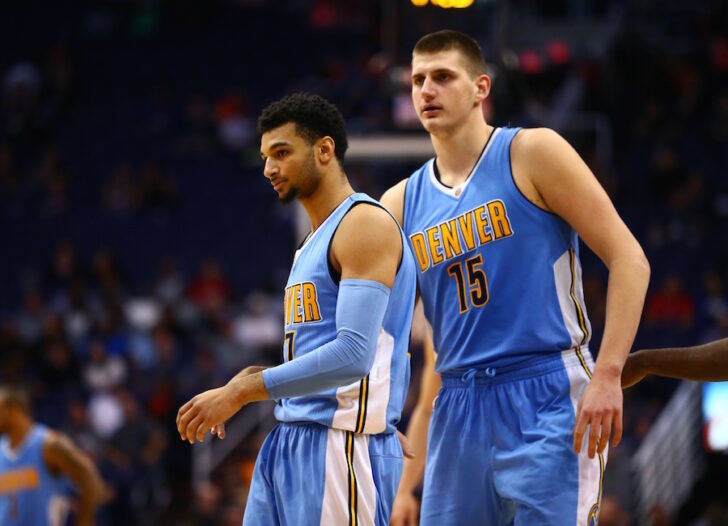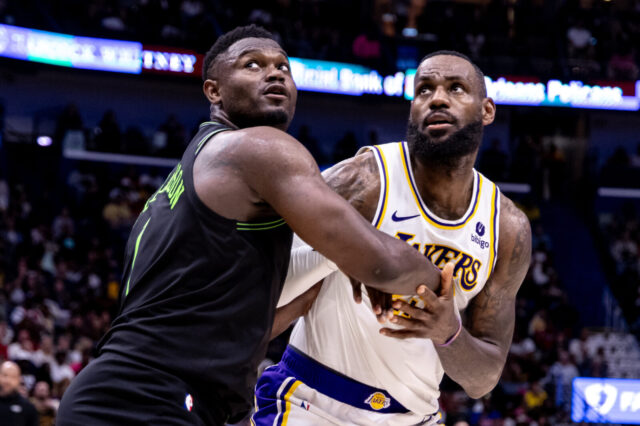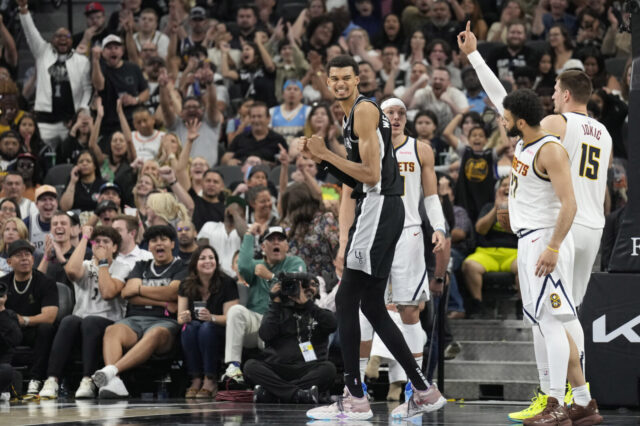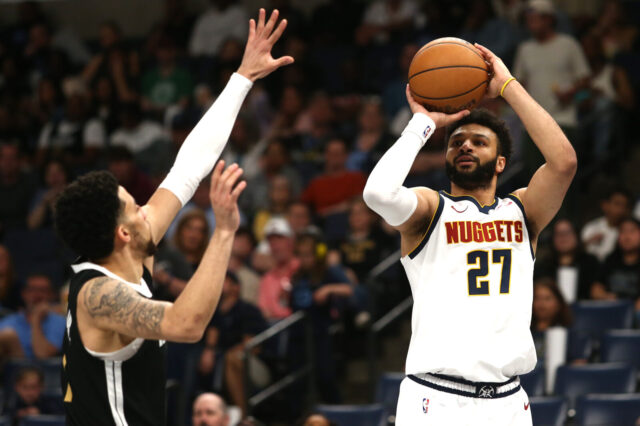Nikola or Jamal?
Jamal or Nikola?
Which of those two — with all due respect to Gary Harris, who could in fact be the Nuggets’ best player — is the face and future of the franchise?
If you’re the Denver Nuggets, or someone who cares about them, this is a fantastic dilemma to have. Nikola Jokic or Jamal Murray? Jamal Murray or Nikola Jokic? The comforting, fence-riding answer: Both.
The Nuggets are in a unique position; they have two young stars that have already been dubbed the future of team. Not only have they been tabbed as such, the organization has taken a not-so-subtle stance on each player as it pertains to trade rumors. Clearly, Denver is committed to Jokic and Murray.
Nuggets GM Tim Connelly drew a line in the sand last season when he dealt Jusuf Nurkic to Portland, essentially sending the message right then and there that his team would be centered around Jokic, who didn’t play particularly well alongside Nurkic. From that point forward, it was understood that Jokic was untouchable.
Right or wrong, Murray was attached to practically every big-name trade that could have come Denver’s way of late. Jimmy Butler. Kyrie Irving. Eric Bledsoe. As the possibility of bringing any or all of them to Denver was murmured, so too was the question: Would the Nuggets be willing to let go of Murray in order to get a bona fide NBA star? Whether or not teams were asking for Murray, specifically, will forever be publically classified as “rumor” or “popular opinion” or “probably.” Odds are good that where there’s smoke there’s fire. But Connelly held tight. No trade occurred. Again, the message, as it was with Jokic, was clear: The Nuggets were committing to Murray.
There are plenty of NBA players who are currently better than both Jokic and Murray (the 2018 All-Star roster bears this out, and that’s okay — remember, these guys are extraordinarily young). There is probably a player who could be substituted for either player that might make the Nuggets a five seed instead of a seven come playoff time. There is not, however, a combination that possesses a higher upside. The hope in Denver is that two to three years from now that upside will be realized about the time some of the Western Conference powerhouses are getting long in the tooth or salary cap strapped. This season, making the playoffs would be nice; the real goal is winning it all three years from now.
This is not some new revelation. It’s merely setting the stage for what’s to come, most likely on the backs of Jokic, Murray and Harris — undoubtedly the Nuggest core.
***
It’s been written that the model the Nuggets are trying to adopt is the same one Golden State used to become one of the best teams in NBA history. That’s all fine and well, but it’s also pretty lofty. Will Harris and Murray become Klay Thompson and Steph Curry? That’s a big ask. That would mean that Denver’s duo would become two of the greatest shooters the game has ever known. Not impossible, but also not easy. And is Jokic capable of becoming Draymond Green? Jokic might even be more skilled, but most would agree he’s not as fierce, not as nasty. And, at some point, can Denver land one of the league’s best player (i.e., someone like Kevin Durant) to fully complete the model?
That’s a lot of betting on long odds. The Warriors’ design might be the new trend (Why wouldn’t it be? The results speak for themselves), but in reality, they’re the exception. Few championship teams in NBA history have the Warriors’ makeup. More likely, the typical championship team has two or three stars and a lot of solid role players. Perhaps more importantly, most of the best teams have had a clear-cut Alpha dog, and a an extremely good “next best.”
A more applicable example? How about the Lakers, circa 2007 to 2010?
Kobe Bryant was indisputably the Alpha. He was fearless, and nobody other than Bryant was taking the game’s biggest or last shot. There wasn’t any person in any arena in America who didn’t know that; yet, it didn’t matter, and it was rarely stopped.
Pau Gasol was a silky four-five. His skills were superior, even if he wasn’t as physical or nasty as some of the Association’s historically great big men. Gasol, who could score and rebound and pass, was a fantastic complement to Bryant. Never once was he the guy, and that was okay.
The rest of the Lakers? Nice players. Very good players. Never great. A series of capable also-rans who filled in nicely but never kept opposing coaches up at night. (Quick: Name the “other” starters on the Lakers teams that won in 2009 and 2010. I’ll wait.)
In the three seasons the Lakers advanced to the NBA Finals from 2007 to 2010, Bryant averaged 27.3 points per game, 5.1 assists and 5.6 rebounds. He was 29, 30 and 31 years old over those three seasons. Gasol, from age 27 to 29, averaged 18.7 points, 3.5 assists and 9.6 rebounds.
For the sake of argument, let’s quickly say Jokic, who currently averages 16.5 points, 10.4 rebounds and 5.5 assists — all at the age of 22 — is well on his way to becoming (see, surpassing) Gasol.
Can Murray become Kobe Bryant? Saying he will is almost unfair to Murray. After all, you’re talking about one of the top five (top three?) players ever. But, in recent weeks, if any Nuggets has shown a killer instinct, a willingness and joy to go toe-to-toe with the opposition’s superstar, to take the big shot or put his team on his back, it’s unquestionably Murray. He’s not entirely consistent just yet, but he’s certainly had games where it appears that the switch has flipped.
At age 20, Murray is averaging 16.5 points, 2.9 assists and 3.6 rebounds. For the sake of comparison, when Bryant was 20 his numbers were 19.9, 3.8 and 5.3. Then again, that was his third year in the league, and it was shortened by injury. In Bryant’s second season — which is where Murray is currently — he averaged 15.5, 2.5 and 3.1.
Yes, Murray still has work to do. And no, Bryant’s greatness cannot possibly be measured by statistics alone. But even if Murray becomes “80 percent” of Bryant someday, things will look solid in Denver. Efficiency and production will come with age and experience. That killer instinct that Bryant possessed is God-given. From recent observation, Murray just might have a bit of that in his makeup.
The rest of the Lakers, remember, were solid players. At the moment, it’s probably fair to say that Gary Harris could (see, will) become every bit as good or better than the best of the best “other Lakers.” In fact, with current averages of 17.4 points, 3.2 assists and 2.8 rebounds, he’s already a better scorer than any “third” Laker from 2007 to 2010.
The Nuggets core has been established. If Jamal Murray can truly become an Alpha Dog, and if the team’s development stays true for two or three seasons, there’s reason to believe the Nuggets could model themselves after the Kobe-Pau Lakers — not Golden State, an anomaly amongst great teams and perhaps an unrealistic example at best.
Denver, a city that was twice ousted from the playoffs by the Lakers in that three-year span Kobe and Pau won two titles, should patiently welcome that thought.



